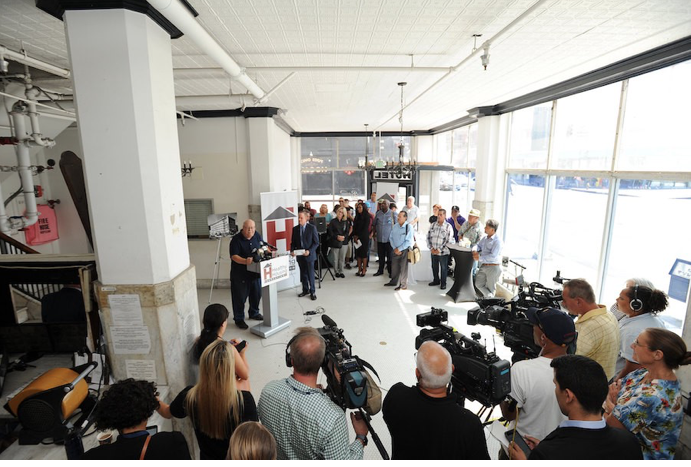Comments
HOUSING WATCH - In 2017, as an urgent response to Los Angeles’ worsening homelessness crisis, AIDS Healthcare Foundation, the world’s largest HIV/AIDS medical-care nonprofit, decided to buy old residential hotels and motels in the L.A. area and quickly turn them into housing for the vulnerable. In only four years, this adaptive-reuse model became an extraordinary success: AHF produced more than 1,300 units of low-income and homeless housing, with more in the pipeline. The nonprofit’s work won praise and interest from politicians, activists, and formerly unhoused residents alike.
But when AHF considered buying hotels in certain sections of Downtown L.A. that are monitored by a kind of legal instrument called the Wiggins Settlement Agreement, the organization noticed an alarming trend: all of them were nearly empty. With thousands of unhoused individuals living on the streets and desperately in need of housing, it was a shocking discovery, and led to an important question: How could this have been avoided? Enter Barbara Schultz.
Schultz is the director of housing justice at Legal Aid Foundation of Los Angeles. Many years ago, Schultz sued the Community Redevelopment Agency of Los Angeles and others to preserve existing affordable housing in residential hotels, which were used by low-income residents, in certain areas of Downtown L.A. The result of the lawsuit was the 2006 Wiggins Settlement Agreement.
Through the settlement agreement, Schultz forced the CRA to maintain and monitor a baseline of affordable units in residential hotels. She also got the agency to create a “Job Training Trust Fund” and put a sizable $2.5 million into it. Controversially, Legal Aid Foundation and Los Angeles Community Action Network, a homeless advocacy organization where Schultz has been a longtime board member, grabbed $1,796,808 — or 72 percent — of the $2.5 million to build new offices.
But while Schultz was looking out for the interests of Legal Aid Foundation and LACAN, she was apparently not doing the same for low-income and unhoused residents.
With her lawsuit, Schultz had the perfect opportunity to ensure that the CRA not only tracked the number of affordable units in residential hotels but also kept watch for how many of the units were actually occupied. After all, what’s the use of affordable housing if people aren’t living in it? Oddly, that monitoring system doesn’t exist in Wiggins Settlement Agreement. It begs another question, why not?
That’s an especially important question today. While the city of L.A. struggles to build and find housing for unhoused residents, thousands of affordable rooms in Downtown L.A. residential hotels are empty. Schultz and Legal Aid Foundation, in fact, have a long list of questions they must answer about their problematic handling of the Wiggins Settlement Agreement, including a lucrative deal they made with Onni Group.
Onni Group, a major developer in L.A., owned the Havana Hotel and wanted to renovate it. Onni also no longer wanted the Downtown L.A. residential hotel to be covered by the Wiggins Settlement Agreement. What happened? Schultz and Legal Aid Foundation cut a deal with Onni, which agreed to make four payments totaling $1 million to the Jerome Memorial Justice Fund, a fund that Legal Aid Foundation administers. The Havana Hotel, in return, was no longer subjected to the Wiggins Settlement Agreement, which resulted in the permanent loss of 36 affordable units.
Curiously, while AHF was looking into buying more residential hotels in Downtown L.A., Barbara Schultz started to harass the nonprofit and interfere with its lifesaving housing work.
In one case, Schultz told AHF that it couldn’t perform certain renovations at the Baltimore Hotel, one of AHF’s properties. She believed the project wasn’t compliant with the Wiggins Settlement Agreement, which AHF disputed, especially since the improvements — brand new kitchenettes for rooms that didn’t have them — wouldn’t result in the loss of affordable housing. The added amenity would have benefitted tenants, but AHF couldn’t carry out the renovations because of Schultz’s push back.
Schultz also started representing a former AHF employee, Karla Leiva, who established what seems to be a front group, called Stand for Housing Justice, to attack and shake down AHF. Leiva was fired by the nonprofit for falsifying a disability claim and violating the organization’s employee policies. She appears to be carrying out a personal vendetta against AHF, and Schultz is empowering Leiva.
Worse, by representing Leiva, Schultz has essentially backed Leiva’s bizarre demand that AHF should stop producing new low-income and homeless housing and instead spend tens of millions on homeless services. That runs counter to AHF’s long-established housing model: purchase and renovate residential hotels and quickly move people off the streets and into housing. With thousands of unhoused residents dying on the streets in the L.A. area, they desperately need shelter, and AHF has spent more than $130 million to give it to them. This “housing first” model has wide support, ranging from major homelessness organizations to politicians.
Over the years, thousands of rooms at residential hotels in Downtown L.A. have been emptied out. That’s happened under Barbara Schultz’s watch as the trustee attorney for the Wiggins Settlement Agreement. L.A. elected leaders need to review how Schultz and city agencies are carrying out the Wiggins Settlement Agreement and make reforms wherever needed. People’s lives hang in the balance.
(This column was provided by Housing is a Human Right, the housing advocacy division of AIDS Healthcare Foundation.)






